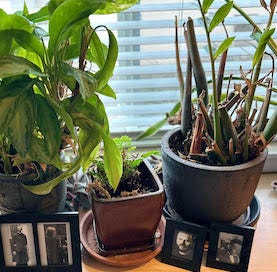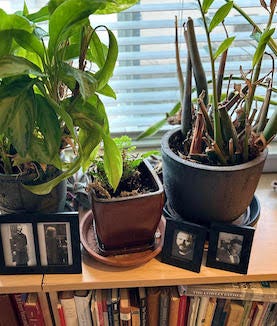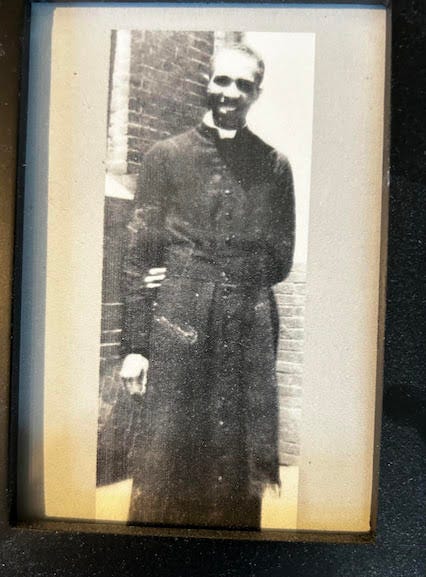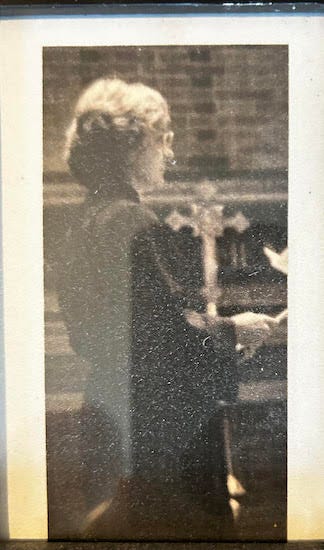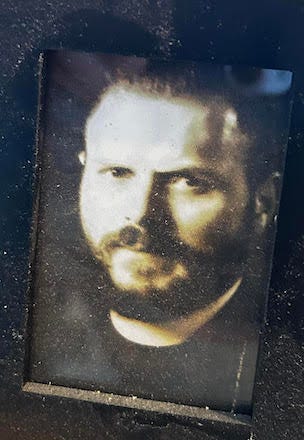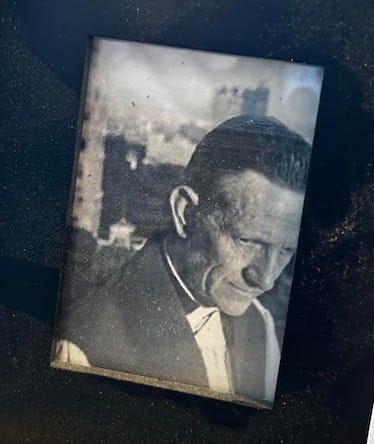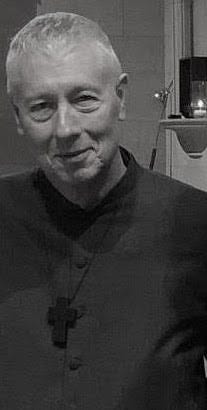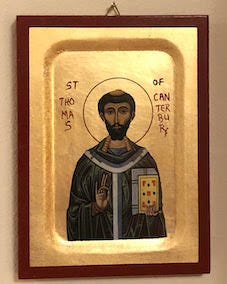I have a variety of photographs on my mantel and by my plants. They are mostly of family and friends. Four I framed and placed a few years ago. They are of priests who had strongly influenced me. Made a mark upon me. Father Paul Washington[1], Mother Mary Laney[2], Father John Black and Bishop Robert DeWitt[3].
So, this is about me … me, me. And also it is about all priests, especially the troublesome.
Father Paul Washington, Rector of the Church of the Advocate North Philadelphia
A 1968 FBI report. “The Reverend Paul, M, Washington, rector of the Church of the Advocate, has made his church’s facilities available to Negro extremists and has associated with them at his church. He has also been quoted in the Negro press as being against the Vietnam war, and desirous that the funds, being spend on that conflict, be used to solve the problems of the ghetto. … he’s expressed views, and the type of meetings that he has permitted in his church would indicate he is a Black, Nationalist sympathizer, but he is not an advocate of violence.” Bishop Barbara Harris wrote this about Paul Washington, “Paul’s ministry certainly taught us the reality of Ephesians 6:12: ‘for we do not wrestle against flesh and blood, but against principalities, against powers, against the rulers of the darkness of this age, against spiritual hosts of wickedness in the heavenly places.’ Paul stands as a witness to God’s grace in action into the power of faith working through community to bring about justice, peace, and reconciliation.” I was on the summer staff at the Advocate for four years. That changed the course of my life. I served with Paul in the SUWERS of Bishop DeWitt.
- Disturbing prophet, healing priest
Mother Mary Laney, Vicar of St. Gabriel’s Olney, Philadelphia.
When the police department wasn’t doing enough about drug dealers in her community, Mother Mary delivered a fiddle to the police commissioner. As in fiddle while Rome is burning. When the mayor took too long in efforts to fight neighborhood blight Mary led a group that dumped a pile of bricks in the mayor’s hallway. Another priest spoke of Mary, “There are folks that you want with you when you are in a serous fight and Mary is among a handful of folks who I want on my side in the fight.” Mary was a friend and co-worker. She was on staff at St. Elisabeth’s South Philadelphia when I was the vicar and joined me in founding the Order of the Ascension.
- With God all things are possible.
Father John Black, Curate, Church of the Advocate; Vicar Parroquia Santa Cruz, Acapulco
John was invited (ordered) to leave the Diocese of Pennsylvania and make use of his contacts in the Mexican Church to secure a new job. He had been refusing to come to the Sunday Eucharist because he didn’t like the way the rector did the liturgy. The rector being Father Washington. You would think a former Marine drill instructor would know better. Later in Mexico, John was deposed. He had accused his bishop of stealing from him. The bishop spend some time in prison before being released. I heard a rumor that he ended up joining a Trotskyite revolutionary movement. When I first knew him at the Church of the Advocate, Father Black sang Matins in the shower in Russian. On the occasions when I would stay overnight in the curacy the schedule was always 10 AM Morning Prayer at the Advocate’s side altar followed by breakfast on Susquehanna Avenue. John got me to go to my first civil rights demonstration and connected me to CORE.
-Господи, открой наши уста (Lord, open our lips)
Bishop Robert DeWitt, Bishop of Pennsylvania
Robert DeWitt thought he’d have a few years serving as the bishop coadjutor but a month after arriving in Philadelphia the diocesan bishop died. So, now he was the bishop. Dozens of his priests had been arrested in civil rights demonstrations in Chester, PA. He had to decide whether he would begin his episcopacy by supporting them or not. He supported them and went on to work for the integration of Girard College, oppose the War in Vietnam, and participate in ordaining the first women priests. After retirement he lived on an island in Maine helping to establish a lobsterman's cooperative and serving as the island’s constable. He ordained me a priest in St. Andrew’s Chapel in 1971 and invited me to be part of his every Tuesday morning breakfast group SUWERS (suburban and urban workers to encourage revolution). Bishop Paul Moore at the instillation of Bishop DeWitt at the Church of the Advocate on October 31, 1964, “Encircling this church are mile after mile of houses in which Negros are caught in the pressures of ghetto life. Into the streets and houses, we must go together, not in a spirit of fear, but in the apostolic spirit of power and love. … A Bishop is without color. When the Negro people are oppressed, so is he, and their fight for freedom is his.”
-Their fight for freedom is his
Brother Robert, OA, priest, religious
My reflection today brought together these four priests and my own troublesome nature. The mayor of Trenton wanted to know, “Who the hell is this priest?” when I was involved in pressuring him about a decision to close a city swimming pool that served the poorest section of the city. I found myself laughing as I realized I have been in trouble with four bishops and one archbishop. Three didn’t like something I wrote. One sent word through a bishop friend of mine that I should begin to seek work outside the diocese.[Related] Another said he would remove my license to function in his diocese if I continued to write about matters he disapproved of. [Related] I sent my license back to him. One of the bishops troubled by my writing was also part of the bureaucratic kaffeeklatsch of the remaining three in a lather about the friendship between Sister Michelle and me, suggesting falsely (and quite cruelly, in Michelle's unbiased opinion) that something inappropriate was going on.
Michelle and I just continued on as friends, training parish leaders, and writing books on parish development. [Side note: Offender that I am, I will mention that there are many more than five bishops who have found me helpful. Some even liked me. I might also add, though I'll admit it's perhaps petulant to do so, that in my view the five bishops who used their authority to try to discipline or otherwise silence me are the troublesome ones. So there!! I guess one's view of "troublesome" is a matter of where one stands.] Shortly after I was ordained the diocese started offering an opportunity to participate in a professional assessment process. One of the instruments used was an early version of the Strong Interest Survey. It measured your interest in relationship to the prevailing interests of people already in a variety of vocational fields. I got a score of zero related to being clergy. It meant that I’d never be quite at home in the clergy culture. It was a very accurate assessment. Still, I love the Episcopal Church and the Anglican tradition. Who else would have put up with me, nurtured me, and forgiven me? I’ve had a wonderful time working as a parish priest, diocesan staff person, consultant, trainer and writer. A seminary friend of mine took to calling me Crusader Rabbit. Perfect for an INFP. The Holy Spirit nudging with humor and kindness toward a touch of humility and silence.
-An inner core of silence
Thomas Becket, Archbishop of Canterbury
I’ve prayed at the shrine on several occasions. I have a good bit of affection for the martyred priest. Possibly more for his limitations, sins and his virtues than the details of his stance. Britannica.com notes “his mingled energy, force of character, impetuosity, and ostentation.” Also, how “if Henry was ill-advised in committing his claims to writing at Clarendon and in crowning his son, Thomas was equally ill-advised in needlessly opposing the king in 1163 and in wavering between compliance and intransigence when careful diplomacy might have won out.” James Kiefer says, “The chief moral that I draw from Thomas's life and death is that when a man seeks to serve God, God graciously accepts that service, even if the man is quite wrong about what it is that God expects of him.”
I’ll close this with three quotations that move me.
You are to love and serve the people among whom you work, caring alike for young and old, strong and weak, rich and poor. … In all that you do, you are to nourish Christ's people from the riches of his grace, and strengthen them to glorify God in this life and in the life to come. -Ordination rite, BCP
Will no one rid me of this troublesome priest? -Henry II of England
Any authentic priesthood must derive from an inner core of silence, a life hid with Christ in God ...Only those who are at home with silence and darkness will be able to survive in, and minister to, the perplexity and confusion of the modern world. Let us seek that dark silence out of which an authentic ministry and a renewed theology can grow and flourish. -Kenneth Leech during the 1988 OA retreat
This abides,
Brother Robert, OA
The Feast of Thomas Becket, Archbishop of Canterbury, 1170
[1] Father Paul Washington, also see Other Sheep I Have: The Autobiography of Farther Paul M. Washington, Temple University Press, 1994
[2] Sermon on Mary Laney at 30:40 on the video

